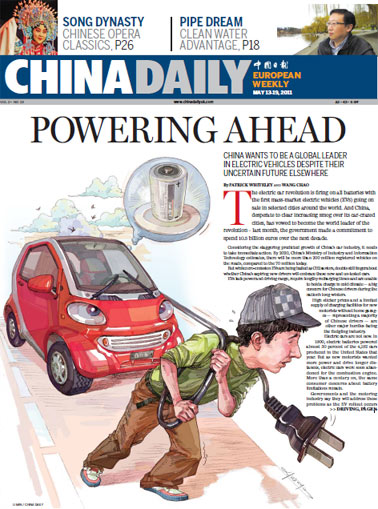Electric cars vital to solving emission problems
Updated: 2011-05-13 10:37
By Lin Cheng (China Daily European Weekly)
Electric commercial vehicles are useful in dealing with urban air pollution and can effectively solve most of the emission problems of today caused by fuel motor vehicles.
But for that to happen, the battery and motor technologies must conform to the technical standards for components stipulated by the government. At the same time, the government can offer functional infrastructure construction services and flexible policy support to promote new energy vehicles.
With the 863 Program and support from the Ministry of Science and Technology and various other local governments, China has established an independent technical standard system, which provides valuable experience of innovation and a solid technical foundation for the development of pure electric vehicles.
Automobiles and oil consumption are among the major sources of pollution in China, and they need to be resolved by use of green technology and alternative products.
Electric cars are also the future for the Chinese automobile industry. They not only offer challenges, but also opportunities for China.
On the aspect of energy use, the load balance of the power grids and energy storage technologies need to be improved and upgraded.
Charging electric vehicles during the night could avoid the secondary use of energy consumption and improve the efficiency of the power grid.
Many countries have already included the development of electric vehicles in their national development strategies. Not only do they offer fiscal support but also have special plans to facilitate investment for research and development.
Most of the major car companies have specific plans to develop electric vehicles as they believe it will be the future for the automobile industry.
After investing more than 2 billion yuan ($214.6 million) on research and development, a group of Chinese universities, companies and research agencies have already established research plans for hybrid, pure electric and fuel cell cars. They are now focusing on developing the power batteries, drive motors and electric control technologies through organized and large-scale joint efforts.
In terms of popularizing the electric vehicle concept, a number of operations were undertaken during the past few years in several cities across China.
Based on these successful models, the Ministry of Finance and Ministry of Science and Technology began to promote energy conservation and new energy vehicle demonstration concepts and decided to give financial subsidies.
The government has set a goal of promoting more than 100,000 electric vehicles nationwide in the next few years. Beijing, Shanghai, Changchun, Shenzhen, Hangzhou and Hefei are experimental cities which plan to offer subsidies for private purchases.
By the end of March this year, a total of 25 pilot cities have popularized more than 10,000 various types of electric vehicles and carried more than 9 billion passengers. These figures indicate that the combination of fiscal policies and research have made a key step towards success.
Energy conservation has become the consensus of the automotive industry, but choosing the appropriate technical method has often been disputed.
In general, there are two ways to save energy and cut emissions. The first approach involves upgrading the engine technology or adopting alternative fuel to cut emissions and achieve fuel efficiency, such as using advanced engine and natural gas engines.
The second approach calls for the employment of a new power system running on fuel cells that produce zero emissions. This technology is currently still in the testing stages and is being viewed as the future for electric vehicles.
Currently, it is difficult to achieve independent innovation in this field. Under such circumstances, pure electric vehicles powered by chemical batteries is a relatively mature technology and can achieve zero emissions. China is proficient in producing power batteries and drive motors after having successfully developed electric bicycles and electric vehicles for several years now.
China also has sufficient lithium and rare earth resources to fuel the development of pure electric vehicles. Developing pure electric vehicles, is therefore in accordance with China's interests and domestic demand.
The author is professor and vice-director of the National Engineering Laboratory for Electric Vehicle, Beijing Institute of Technology.
E-paper

War of the roses
European Chinese rose growers are beating their Chinese rivals at their own game
Preview of the coming issue
High-tech park gets big boost
At the source
Specials

New wave
Coastal city banks on marine sector to ride next stage of economic development

Drunk driving
Drunk drivers face a detention for one to six months and a revokation of their drivers' license.

V-Day parade
A military parade marking the 66th anniversary of the Soviet victory over Nazi.
